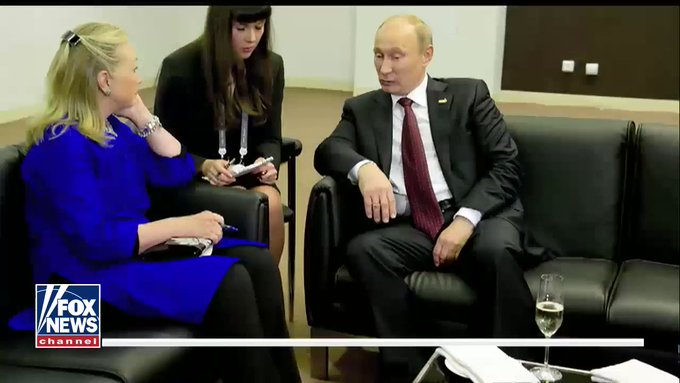The FBI’s informant in the Uranium One scandal involving the Obama administration gave written testimony to three congressional committees this week in which he accused the Obama administration of making decisions that directly benefited the Russian government and their goals of gaining geopolitical advantages over the United States.
The informant, Douglas Campbell, told congressional investigators on Wednesday that Moscow sent millions of dollars to the U.S. with the expectation that it would benefit the Clintons, while Hillary Clinton "quarterbacked a 'reset' in US-Russian relations" in her role as Secretary of State during the Obama administration, The Hill reported.
Key facts:
- Campbell participated in closed-door interviews with the Senate Judiciary, House Intelligence and House Oversight and Government Reform committees.
- Campbell said that Russian nuclear officials told him that Moscow hired an American lobbying firm, APCO Worldwide, because it was in a unique position to influence the Obama administration, Hillary Clinton in particular.
- Democrats are aggressively trying to discredit him but are having little success as "the FBI found Campbell’s undercover work valuable enough to reward him with a $50,000 check in 2016."
- Campbell says that the FBI told him that his work was "briefed to President Obama as part of his daily presidential briefing," which would mean that Obama was aware of the crimes committed by the Russian officials.
- The FBI forced him to pay $500,000 of his own money to Russian officials as bribes to facilitate his cover, and the bureau never reimbursed him despite their praise of his work and the fact that the ordeal was so stressful that he developed serious, life-threatening illnesses.
- Initially, reports indicated that Campbell was threatened by the Obama administration in an attempt to silence him before the 2016 election as they did not want this case hurting Hillary Clinton after then-Attorney General Loretta Lynch's Justice Department learned that he filed a lawsuit in a Maryland federal court. It was not immediately clear what the lawsuit was about, however Sara Carter reports: "Campbell filed a lawsuit in Maryland federal court against the Russian nuclear entities asking for the return of the money he had to launder out of his own paychecks."
- "Russian and American executives implicated in the Tenex bribery scheme specifically asked him to try to help get the Uranium One deal approved by the Obama administration," The Hill noted.
- He provided documentation of the corruption and crimes taking place to help Russia to the Obama administration months before they made a series of decisions that directly benefited Vladimir Putin and the Russian government.
- He provided documentation to the Obama administration that showed that the Russian government was actively involved in trying to help Iran develop their nuclear capabilities years before the Obama administration implemented the now-infamous Iran deal.
- He said that he was told by the FBI that the politics of the Obama administration overruled justice from taking place against the criminal activity that was happening.
“I was frustrated watching the U.S. government make numerous decisions benefiting Rosatom and Tenex while those entities were engaged in serious criminal conduct on U.S. soil,” Campbell said in his testimony, as reported by The Hill's John Solomon. “Tenex and Rosatom were raking in billions of U.S. dollars by signing contracts with American nuclear utility clients at the same time they were indulging in extortion by using threats to get bribes and kickbacks, with a portion going to Russia for high ranking officials.”
“I remember one response I got from an agent when I asked how it was possible CFIUS would approve the Uranium One sale when the FBI could prove Rosatom was engaged in criminal conduct," Campbell continued. "His answer: ‘Ask your politics.'"
Some of the key players that were engaging in the criminal racketeering case have started to face justice, albeit years later. Sara A. Carter reports:
It wasn’t until years later in 2015 that American businessman Daren Condrey, whose company Transportation Logistics International, plead guilty to conspiring to violate the Foreign Corrupt Practices Act (FCPA) and conspiring to commit wire fraud, according to the DOJ.
Russian national Vadim Mikerin, who was a top official of the Russian nuclear arms subsidiary Tenex and would later become president of Tenam the American subsidiary of Rosatom, was also sentenced in December 2015. Mikerin, who only plead guilty to money laundering, was arrested for a racketeering scheme that dated back to 2004. He was sentenced to 48 months in prison.
Boris Rubizhevsky, another Russian national from New Jersey, who was president of the security firm NEXGEN Security, was also involved in the conspiracy and plead guilty to conspiracy to commit money laundering in 2015. He served as a consultant to Tenam and to Mikerin. Rubizhevsky was sentenced to prison last year along with three years of supervised release and a $26,500 fine, according to a recent Reuters report.
And Mark Lambert, 54, a co-owner of Transportation Logistics International, was charged this month on an “11-count indictment with one count of conspiracy to violate the Foreign Corrupt Practices Act (FCPA) and to commit wire fraud, seven counts of violating the FCPA, two counts of wire fraud and one count of international promotion money laundering,” as stated in the DOJ press release. Lambert’s charges stem from an alleged scheme to bribe Mikerin in order to secure contracts with TENEX, according to the DOJ release.

